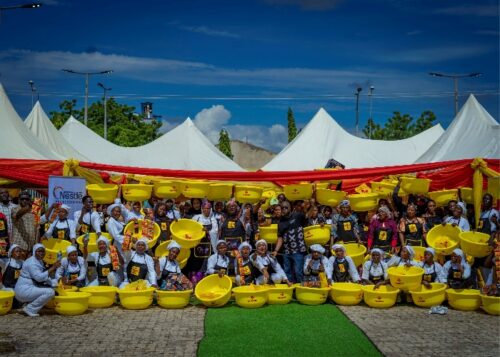
At a time when millions of Nigerians struggle to access a healthy, balanced diet, Nestlé Nigeria is quietly leading a transformation. Far from flashy CSR campaigns, the company is embedding nutrition and affordability at the heart of its business from product innovation, local-sourcing and community empowerment. Their work is quietly reshaping what it means to eat well in Nigeria.
One of the standout moves has been the introduction of NIDO Milk & Soya Instant Powder Mix a unique dairy-and-plant-blend product fortified with iron, protein, calcium, vitamin C and dietary fibre, developed locally and produced using 100% Nigerian-sourced soybeans. By addressing the widespread issue of micronutrient deficiency especially among school-age children (71%) and women (47.3%) in Nigeria, Nestlé Nigeria is providing a nutritious option that is both affordable and locally relevant.
In tandem, their Out-of-Home business arm introduced Maggi Soya Chunks a cost-effective, soy-based textured protein source aimed at food vendors and small eateries. The product supports food-service business profitability while helping consumers access affordable protein. One pack reportedly serves eight people. At a time of economic pressure and rising food costs, the move not only supports nutrition but also supports micro-entrepreneurs.
Likewise, the iconic cereal brand Golden Morn 3‑in‑1 was launched to provide a ready-to-eat cereal at a price point accessible to many households, combining maize, soya and milk with fortification to promote immunity, protein, calcium and fibre.
Nestlé Nigeria isn’t only manufacturing products they are also investing in behaviour change and ecosystem support. Through workshops like the “Business of Food” series, they train over 2,000 food vendors across nine states, equipping them to use affordable, nutritious ingredients (like Soya Chunks) and to maintain business viability. This approach ensures that the link between affordability and nutrition doesn’t stop at the supermarket shelf, but extends into the food served on streets, canteens and home kitchens.
Their annual reports show a bold commitment to “affordable nutrition” for example, 80%+ of their food & beverage volume is fortified with micronutrients including iron and vitamin A, and the company actively tailors products to local tastes and pocket‐sizes.
Nigeria is facing a nutrition crisis. An estimated 172 million Nigerians cannot afford a healthy diet. In this context, Nestlé Nigeria’s efforts become more than corporate activity they evolve into social infrastructure. By making nutritious food accessible and affordable, they help reduce hidden hunger, promote healthier lives, and support economic resilience (local sourcing, small-vendor empowerment, value chain growth).
There’s a domino effect at play, better nutrition improves health, boosts productivity, lowers healthcare burden and when the foods are accessible and affordable, the impact scales. By focusing on both affordable pricing and nutritional value, Nestlé Nigeria is aligning business success with societal benefit.
Moreover, ensuring sustained behaviour change (choosing nutritious options, cooking habits, supply chain reliability) requires continuous effort. Awareness, education and local empowerment must walk hand-in-hand with product availability.
For Nestlé Nigeria, the task is clear, unlock the power of food not only for taste and profit, but for life and livelihood. With innovations like NIDO Milk & Soya, Maggi Soya Chunks and Golden Morn 3-in-1, the company is weaving affordability and nutrition into everyday meals. It’s not just business it’s a shared-value strategy that touches kitchens, communities and economies.
In a nation where healthy diets are unaffordable for many, this kind of shift matters. Food becomes not just fuel, but possibility one affordable packet, one prepared meal, one vendor trained at a time. For millions of Nigerians, the harvest of health may already be underway.
